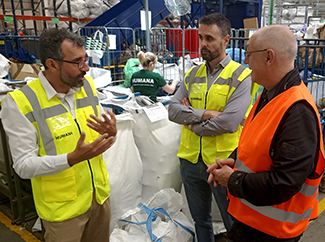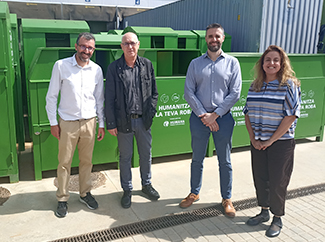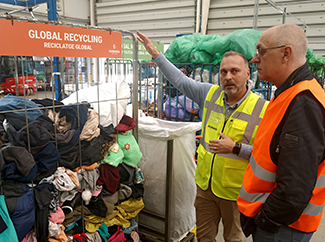consent_cookie
Duración: 1 year
Stores the user's cookie consent state
19-05-2025
Humana, a textile waste manager for 38 years, denounces that the current system of reserving public contracts for the selective collection of textile waste ‘reduces real competition, favours a closed lobby and harms entities such as Humana’. This is what the social economy organisation has told the director of the Catalan Waste Agency (ARC in Spanish), Albert Planell, who this morning visited the textile preparation for reuse (PxR) plant that the organisation has in l'Ametlla del Vallès (Barcelona).
Humana, with a workforce of 249 people in Catalonia, has taken advantage of the visit of the director of ARC to publicly present its vision of the present and the future of a sector that is going through a key moment.
‘I was able to see first-hand the work of Humana, which has a very elaborate working system for giving a second life to used clothing. It is one of the important players in the sector in Catalonia’, explained the director of ARC, who added: “There is a lot of work to be done to multiply the collection ratios and prevent them from ending up in landfill”.
Local administrations are the main organisers of the collection of post-consumer textiles, which is why they issue public tenders to award the service. Law 7/2022 of 8 April on Waste and Contaminated Land for a Circular Economy stipulates that there is a market reserve of 50% of the public tender for the collection of waste for contracts with integration companies and special work centres authorised to manage waste.
‘We are not opposed to the reservation of contracts; on the contrary, it can be a useful and positive tool if it is done with plurality criteria, such as the division into lots,’ says Rubén Fernández, national promoter of Humana, who adds: ’The problem is that the reservation applied as it is currently done and promoted reduces real competition and systematically favours a very small group of operators. This operation favours a closed lobby and harms entities such as Humana, with a consolidated track record in the reuse and sustainable management of textiles for almost four decades’.
In this sense, the director of ARC assured: ‘The law establishes a 50% reserve under these conditions. This percentage is a minimum, and it is up to each city council to decide whether to increase it or not’.
On the current situation in the sector
The aforementioned law makes the selective collection of used clothing compulsory in all EU countries as of this year. ‘In Catalonia, the collection of textile waste is stagnating. In addition, Humana loses collection quota year after year, despite having an extensive infrastructure and operational capacity. Furthermore, it must be said that we do not collect in any municipality with more than 100,000 inhabitants’, acknowledges the organisation's representative.
The Agency's director said: ‘We are working with all the organisations in the sector, within the framework of the Circular Fashion Pact, to increase the number of tonnes of clothes that are recovered. We cannot continue with this fashion of buying cheap and throwing away, bearing in mind that clothes are increasingly of poorer quality and cannot be reused’.
As for the future of the sector, Humana believes that ‘we must take advantage of all the existing infrastructures in the territory: containers, logistics centres, experienced operators...’ ‘We cannot allow them to be underused. The key is to build a more inclusive, efficient and transparent model that responds to the environmental and social challenge represented by textile waste. Humana reiterates its availability and commitment to collaborate with administrations and other agents to achieve this common goal’, he adds.


